Readings Newsletter
Become a Readings Member to make your shopping experience even easier.
Sign in or sign up for free!
You’re not far away from qualifying for FREE standard shipping within Australia
You’ve qualified for FREE standard shipping within Australia
The cart is loading…






On the 50th anniversary of In Place of Strife, this scholarly study makes extensive use of previously unpublished archival and other primary sources to explain why Harold Wilson and Barbara Castle embarked on legislation to regulate the trade unions and curb strikes, and why this aroused such strong opposition, not just from the unions, but within the Cabinet and among backbench Labour MPs. This opposition transcended the orthodox ideological divisions, making temporary allies of traditional adversaries in the Party. Even Wilson’s threats either to resign, or call a general election, if his MPs and Ministers failed to support him and Castle, were treated with derision. His colleagues called Wilson’s bluff, and forced him to abandon the legislation, in return for a ‘solemn and binding’ pledge by the trade unions to ‘put their own house in order’ in tackling strikes. – .
$9.00 standard shipping within Australia
FREE standard shipping within Australia for orders over $100.00
Express & International shipping calculated at checkout
On the 50th anniversary of In Place of Strife, this scholarly study makes extensive use of previously unpublished archival and other primary sources to explain why Harold Wilson and Barbara Castle embarked on legislation to regulate the trade unions and curb strikes, and why this aroused such strong opposition, not just from the unions, but within the Cabinet and among backbench Labour MPs. This opposition transcended the orthodox ideological divisions, making temporary allies of traditional adversaries in the Party. Even Wilson’s threats either to resign, or call a general election, if his MPs and Ministers failed to support him and Castle, were treated with derision. His colleagues called Wilson’s bluff, and forced him to abandon the legislation, in return for a ‘solemn and binding’ pledge by the trade unions to ‘put their own house in order’ in tackling strikes. – .